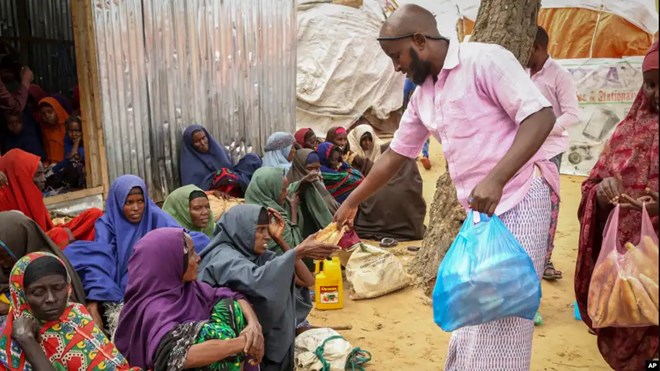
Mohamed Dhaysane
Wednesday July 6, 2022

FILE - Somalis who fled drought-stricken areas receive charitable food donations from city residents after arriving at a makeshift camp for the displaced on the outskirts of Mogadishu, Somalia, June 30, 2022.
MOGADISHU, SOMALIA — At least 500 children have died this year of malnutrition as Somalia deals with record-breaking drought, the U.N. Children’s Fund (UNICEF) said.
UNICEF Somalia says the death toll is just the “tip of the iceberg” as many deaths go unreported.
UNICEF Somalia spokesman Victor Chinyama told VOA the drought is having its worst effects on children, with 400,000 at risk of severe acute malnourishment.
If not reached immediately with emergency support, those children will be in danger of dying, Chinyama added.
"And so far, we have recorded about 500 deaths of children that have been admitted for severe acute malnutrition and this is only a tip of the iceberg because we know that there are many more children whose deaths are never recorded. These children are dying in their homes, they are dying on the way as they travel in search of help," he said.
"Help is desperately needed at this point," Chinyama said.
He said UNICEF Somalia has appealed for $112 million in emergency funds for this year but have only received about half.
The worst drought in the Horn of Africa in four decades is set to get worse as the region faces a fifth straight failed rainy season.
Officials in the town of Dolow, on Somalia’s border with Ethiopia and Kenya, say they still host about 10,000 people displaced from the last major drought in 2011.
In a visit Sunday to an IDP camp in Dolow, Mayor Mohamed Hussain Abdi told VOA that are caring for about 3,000 displaced people from the current drought.
Somalis are arriving every day in search of food, water and shelter, Abdi said.
"Dolow is a hub of U.N. agencies and international organizations. Dolow is a borderline area. And that resulted, you know, large number of internal displaced persons come here to seek ... help from U.N. agencies and the government," he said.
Somalia President Hassan Sheikh Mohamed, who was elected in May, appointed that same month a special envoy for drought response, Abdirahman Abdishakur Warsame.
Warsame has been tasked with scaling up aid to those Somalis most in need.
Warsame visited Dolow in June and told VOA that officials were doing everything they could to avert famine.
"That’s why we are calling (on the) international community and international donors to pay attention to Somali drought and increase their level of humanitarian assistance. Also, my government will do as much as possible to facilitate and contribute the assistance of the aid and support to the people who are affected by the drought," he said.
The U.N. Office for the Coordination of Humanitarian Affairs (UNOCHA) said since January they’ve provided life-saving assistance to nearly 4 million Somalis.
In late June, the U.N. and its partners launched an appeal for nearly $1 billion for a Drought Response and Famine Prevention Plan in Somalia that would target 6.4 million people.